英语语法:带有否定词的比较句型
- 格式:docx
- 大小:37.64 KB
- 文档页数:2

初中英语否定句用法归纳-CAL-FENGHAI.-(YICAI)-Company One1初中英语否定句用法归纳一、用一般否定词not,否定了英语中的绝大多数句子。
1、对be动词的否定,在后面加上not。
He is not a student.2、对谓语动词的否定,根据人称和时态在前面加上助动词don’t, doesn’t, didn’t。
He didn’t watch TV last night.3、对助动词的否定,在后面加上not。
He has not been to Shanghai before.5、对need, dare的否定:need和dare除了可以用作情态动词外,还可以用作普通的行为动词,即除了上表中的否定形式外,还有don’t need to和don’t dare to的否定形式。
在实际运用中需注意。
6、对has/have 的否定:have在现在完成时中为助动词,其否定形式在后面加上not,作为“有”的意思,其否定形式也可以在后面加not,即hasn’t和haven’t,但该用法在课本中没有出现。
所以,不管have作为什么意思,只要不是用作助动词构成现在完成时,其否定形式一律用don’t/doesn’t/didn’t have。
7、不定式的否定:在前面加上not。
即:ask / tell /…sb not to do sth。
8、动名词的否定:在前面加上not。
即:worry about not doing。
9、祈使句的否定:在句首加上Don’t。
如有please,在please后面加上don’t。
Please don’t talk in class.二、通过绝对否定词否定。
此类词如下:never, no, no one, nobody, nothing, nowhere, none, neither, neither…nor…, no more, no longer。
☆特别提醒:1、绝对否定词no相当于not…any…。
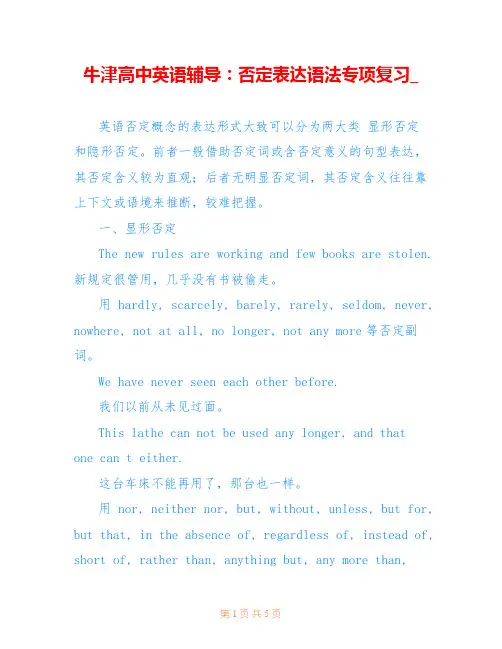
牛津高中英语辅导:否定表达语法专项复习_英语否定概念的表达形式大致可以分为两大类显形否定和隐形否定。
前者一般借助否定词或含否定意义的句型表达,其否定含义较为直观;后者无明显否定词,其否定含义往往靠上下文或语境来推断,较难把握。
一、显形否定The new rules are working and few books are stolen.新规定很管用,几乎没有书被偷走。
用hardly, scarcely, barely, rarely, seldom, never, nowhere, not at all, no longer, not any more等否定副词。
We have never seen each other before.我们以前从未见过面。
This lathe can not be used any longer, and thatone can t either.这台车床不能再用了,那台也一样。
用nor, neither nor, but, without, unless, but for, but that, in the absence of, regardless of, instead of, short of, rather than, anything but, any more than,out of the question, would rather than, in no case, under no circumstance, by no means, in no way, on no condition, beyond, at a loss, above, behind, against, beneath, out of, past等介词或连词表示否定。
He was at a loss what to do next.他不知道下一步该做什么。
I sleep with the window open unless it is really cold.天气若不冷,我总是开窗睡觉。
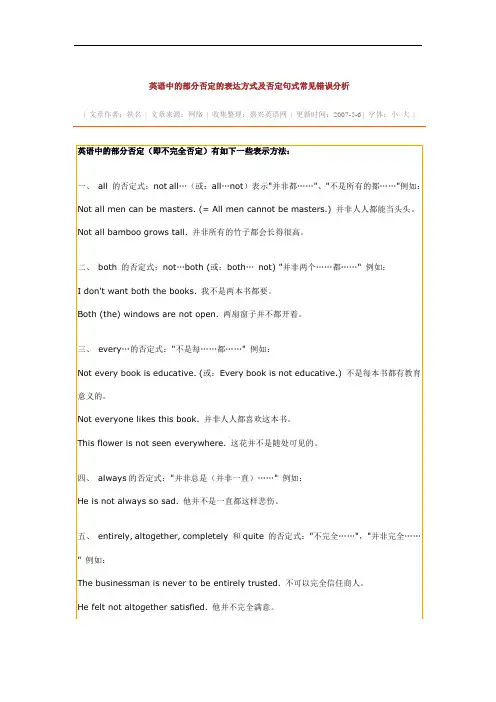
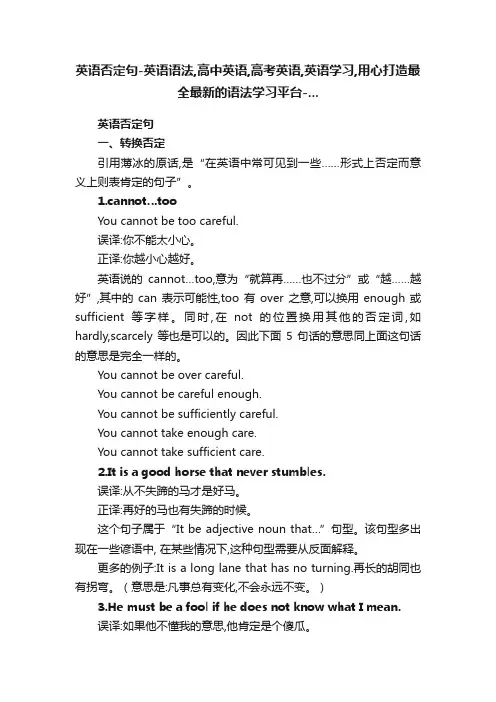
英语否定句-英语语法,高中英语,高考英语,英语学习,用心打造最全最新的语法学习平台-...
英语否定句 一、转换否定 引用薄冰的原话,是“在英语中常可见到一些……形式上否定而意义上则表肯定的句子”。 1.cannot…too You cannot be too careful. 误译:你不能太小心。 正译:你越小心越好。 英语说的cannot…too,意为“就算再……也不过分”或“越……越好”,其中的can表示可能性,too有over之意,可以换用enough或sufficient等字样。同时,在not的位置换用其他的否定词,如hardly,scarcely等也是可以的。因此下面5句话的意思同上面这句话的意思是完全一样的。 You cannot be over careful. You cannot be careful enough. You cannot be sufficiently careful. You cannot take enough care. You cannot take sufficient care. 2.It is a good horse that never stumbles. 误译:从不失蹄的马才是好马。 正译:再好的马也有失蹄的时候。 这个句子属于“It be adjective noun that…”句型。该句型多出现在一些谚语中, 在某些情况下,这种句型需要从反面解释。 更多的例子:It is a long lane that has no turning.再长的胡同也有拐弯。(意思是:凡事总有变化,不会永远不变。) 3.He must be a fool if he does not know what I mean. 误译:如果他不懂我的意思,他肯定是个傻瓜。 正译:他就是再傻也会懂得我的意思。 4.She study no harder than me. 误译:她学习不如我努力。 正译:她和我学习都不努力。 在一些no(not) adj.比较级的句子里,意思是肯定的。 更多的例子:I couldn’t agree with you more .我非常同意你的观点。 5.I never got no sleep in those days. 误译:那些日子我从来没有不睡觉。 正译:那些日子我怎么也睡不着。 英语和汉语一样,本来两个否定会成为一个肯定,但有时为了强调否定的语气,在通俗的口语中 会有双重否定仍表否定的情况。 更多的例子:“I don’t know nothing about what’s waiting for me,”said Thrash.施腊希说:“我不知道我未来的命运如何。” 二、否定句并非都表示否定 (一)含有否定词not,no,nothing,never等或表示部分否定的词hardly,barely等的句子被称为否定句。英语的否定句表现形式多种多样,应用十分广泛,但形式上的否定并不等于意义上的否定,在很多情况下,形式上的否定句表达的却是肯定的含义,需注意这类句子的理解和译法。 1.not…untiltill直到……才,只有……才 People do not know the importance of friends until they lose them. 人们直到失去了才知道朋友的重要。 You can not learn anything till you get rid of your complacency. 只有去掉自满,你才能真正学点东西。 It was not until midnight that we went to bed. 直到半夜,我们才去睡觉。 2.not…long before 很快就,不久就 It wasn’t long before the conqured the country. 不久他们就征服了这个国家。 It won’t be long before we finish the work.我们很快就会干完这活儿。 It will not be long before they finish the work.他们很快就会干完活儿。 (二) 否定表肯定 Cannot can never 和too, too much, enough, over 搭配表示 “无论怎样……也不会过分,越……越好” This can’t be stressed too strongly.这一点怎么强调也不过分”。 While you are doing your homework, you can’t be careful enough. 你做作业的时候,越小心越好。 The development of society has made it necessary for us to have a good knowledge of Enghish, so we can’t over emphasize the importance of learning English. 1.某些疑问句、感叹句或否定祈使句的表达与回答 例如:---You haven’t been to Quanzhou, have you? ---No, I haven’t. 是的,我没有去过。 比较:---Yes, I have. 不,我有去过。 又如:---Lovely day today, isn’t it? ---Yes, isn’t it? (降调) 是啊,真好。 Isn’t that beautiful! (感叹) 多么美丽呀! 再如:Won’t you have some beer? =Why not have some beer? (邀请)请喝点啤酒吧! ---Take care and don’t eat any more fish. ---I won’t. 好的,我不会再吃的。 2.too…to…结构 例如:I’m sure many firms would only be too glad to have you. 我想好多公司都会非常乐意雇佣你。 又如:The boy was too eager to get the piano. 那男孩非常想得到那架钢琴。 该结构中的形容词往往具有情感色彩,类似还有willing, ready, pleased, anxious等词。 3.cannot … too(much) 或can never/hardly…enough结构 例如:I cannot thank you too much. = I can never/hardly thank you enough. 我对你感激不尽。 此结构意为“无论如何…也不过分”。它还有几个变体的结构:用impossible, difficult 等词代替cannot;以sufficiently, exaggerate, to over-等词替代too/enough。 再如:You cannot take sufficient care. 你要特别小心。 The importance of this session cannot be exaggerated (overemphasized). =It would be impossible to over-estimate the importance of this session. 这次会议极为重要。 4. 某些含有比较级的句子 例如:Considering she will be my wife, I couldn’t be any happier. 一想到她将成为我的妻子,我就幸福无比。 又如:I couldn’t agree more. 我完全同意。 三、某些说明哲理的句子 例如:It is a wise man that never makes mistakes. 智者千虑必有一失。 又如:It is a good horse that never stumbles (绊倒) . 金无足赤,人无完人。 It is a good machine that can work without power. 不论如何好的机器都需要动力。 比较:It is a wise father that knows his own child. 聪明的父亲也未必了解他自己的孩子。 四、某些短语 例如:It has caused me not a little anxiety. 此事使我相当焦虑。 比较:He's not a bit better. 他一点也没有好转。 再如:During his absence in London, I paid a visit to him. 当他在伦敦的时候,我去拜访过他。 这里absence in = presence in,而absence from London 才表示不在伦敦。 五、肯定表否定 1.某些引导词引导的从句 1)before 引导的从句,其动词常与can连用,表明该动作并未发生,意为“不等…就….”。亦表示“ 宁愿(与其)…也不…. ”。 例如:The boy rushed out before I could ask what his name was. 我还没来得及问那小孩的名字,他就已经跑出去了。 He died before he wrote a will. 他还来不及写遗嘱就死了。 再如:He will beg for food before he will ask his parents for money. 他宁可讨饭也不愿意向父母要钱。 2)since 引导的时间状语时,若从句谓语动词为持续性动词或状态动词的一般过去时,在大多数情况下,该句式表示主句的动作(或状态)是从从句的“动作或状态结束时”开始的。 例如:I have stayed at home since I was ill. 自从病愈后,我一直呆在家里。 再如:Six months have elapsed since he smoked. 转眼间他戒烟已有六个月。 比较:I have stayed at home since I have been ill. 自从生病以
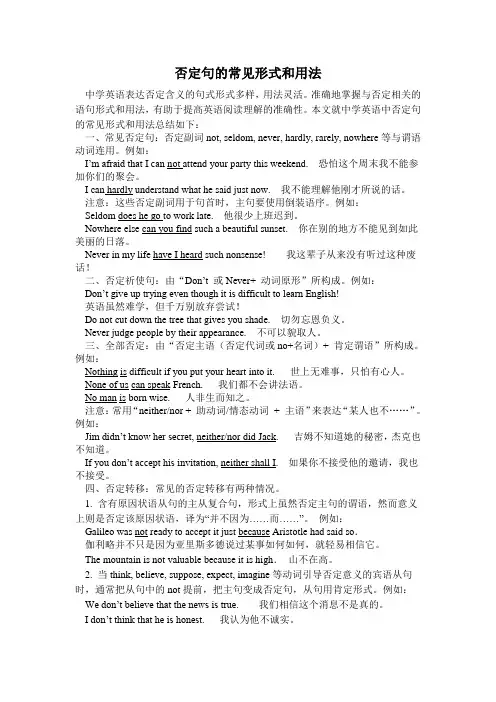
否定句的常见形式和用法中学英语表达否定含义的句式形式多样,用法灵活。
准确地掌握与否定相关的语句形式和用法,有助于提高英语阅读理解的准确性。
本文就中学英语中否定句的常见形式和用法总结如下:一、常见否定句:否定副词not, seldom, never, hardly, rarely, nowhere等与谓语动词连用。
例如:I’m afraid that I can not attend your party this weekend. 恐怕这个周末我不能参加你们的聚会。
I can hardly understand what he said just now. 我不能理解他刚才所说的话。
注意:这些否定副词用于句首时,主句要使用倒装语序。
例如:Seldom does he go to work late. 他很少上班迟到。
Nowhere else can you find such a beautiful sunset. 你在别的地方不能见到如此美丽的日落。
Never in my life have I heard such nonsense! 我这辈子从来没有听过这种废话!二、否定祈使句:由“Don’t 或Never+ 动词原形”所构成。
例如:Don’t give up trying even though it is difficult to learn English!英语虽然难学,但千万别放弃尝试!Do not cut down the tree that gives you shade. 切勿忘恩负义。
Never judge people by their appearance. 不可以貌取人。
三、全部否定:由“否定主语(否定代词或no+名词)+ 肯定谓语”所构成。
例如:Nothing is difficult if you put your heart into it. 世上无难事,只怕有心人。
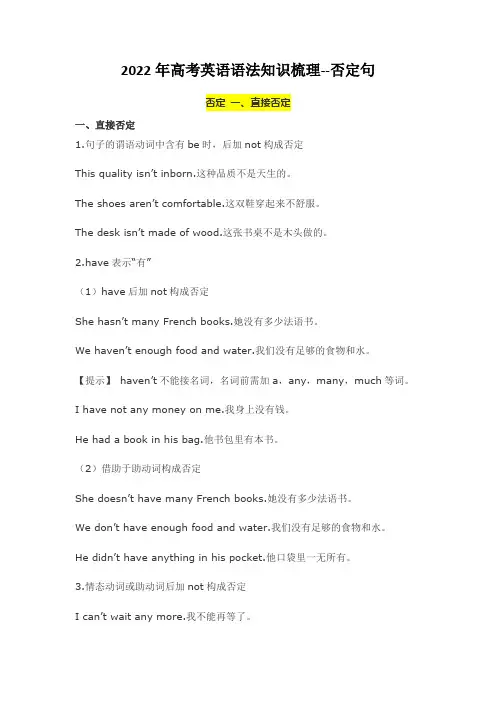
2022年高考英语语法知识梳理--否定句否定一、直接否定一、直接否定1.句子的谓语动词中含有be时,后加not构成否定This quality isn’t inborn.这种品质不是天生的。
The shoes aren’t comfortable.这双鞋穿起来不舒服。
The desk isn’t made of wood.这张书桌不是木头做的。
2.have表示“有”(1)have后加not构成否定She hasn’t many French books.她没有多少法语书。
We haven’t enough food and water.我们没有足够的食物和水。
【提示】haven’t不能接名词,名词前需加a,any,many,much等词。
I have not any money on me.我身上没有钱。
He had a book in his bag.他书包里有本书。
(2)借助于助动词构成否定She doesn’t have many French books.她没有多少法语书。
We don’t have enough food and water.我们没有足够的食物和水。
He didn’t have anything in his pocket.他口袋里一无所有。
3.情态动词或助动词后加not构成否定I can’t wait any more.我不能再等了。
I haven’t received his reply.我还没收到他的答复。
I guess they won’t accept it.我猜他们不会接受它。
4.谓语动词为实义动词时,应借助于助动词do的适当形式加not来构成否定I don’t know her telephone number.我不知道她的电话号码。
She doesn’t look her age.她看上去比实际年龄要年轻。
Tom didn’t realize he was surrounded by crocodiles.汤姆没有意识到自己被鳄鱼包围了。
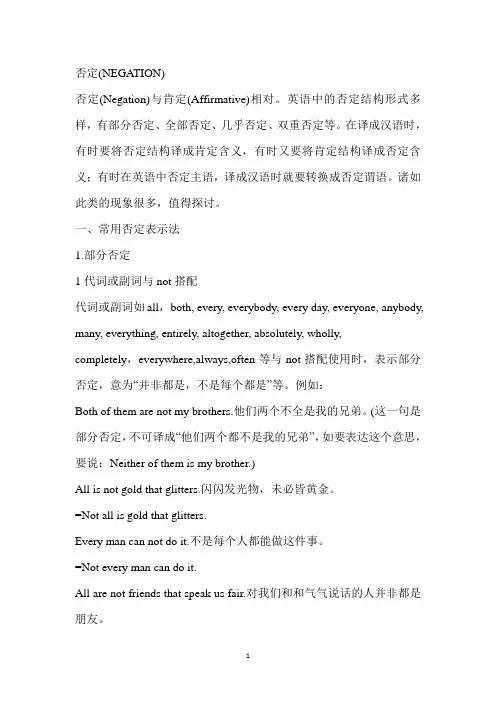
否定(NEGATION)否定(Negation)与肯定(Affirmative)相对。
英语中的否定结构形式多样,有部分否定、全部否定、几乎否定、双重否定等。
在译成汉语时,有时要将否定结构译成肯定含义,有时又要将肯定结构译成否定含义;有时在英语中否定主语,译成汉语时就要转换成否定谓语。
诸如此类的现象很多,值得探讨。
一、常用否定表示法1.部分否定1代词或副词与not搭配代词或副词如all,both, every, everybody, every day, everyone, anybody, many, everything, entirely, altogether, absolutely, wholly,completely,everywhere,always,often等与not搭配使用时,表示部分否定,意为“并非都是,不是每个都是”等。
例如:Both of them are not my brothers.他们两个不全是我的兄弟。
(这一句是部分否定,不可译成“他们两个都不是我的兄弟”,如要表达这个意思,要说:Neither of them is my brother.)All is not gold that glitters.闪闪发光物,未必皆黄金。
=Not all is gold that glitters.Every man can not do it.不是每个人都能做这件事。
=Not every man can do it.All are not friends that speak us fair.对我们和和气气说话的人并非都是朋友。
I do not remember all these formulas.这些公式我并非全都记得。
This kind of tree is not found everywhere.这种树并非哪里都能找到。
Everyone can not answer this question.并非每个人都能回答这个问题。
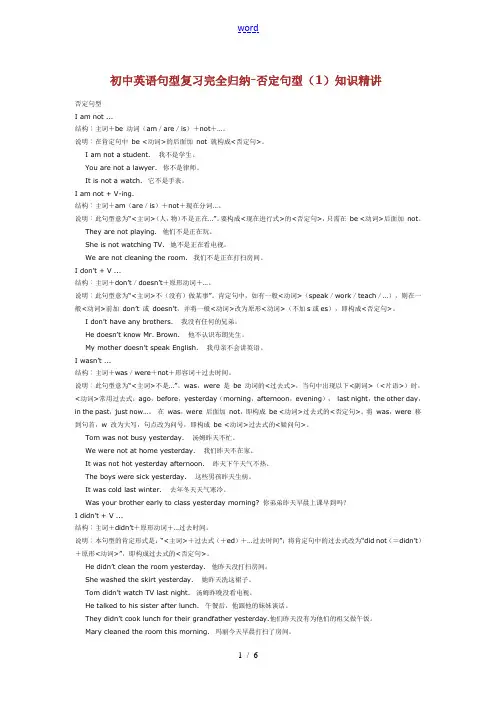
初中英语句型复习完全归纳-否定句型(1)知识精讲否定句型I am not ...结构︰主词+be 动词(am/are/is)+not+…。
说明︰在肯定句中be <动词>的后面加not 就构成<否定句>。
I am not a student. 我不是学生。
You are not a lawyer. 你不是律师。
It is not a watch. 它不是手表。
I am not + V-ing.结构︰主词+am(are/is)+not+现在分词…。
说明︰此句型意为“<主词>(人,物)不是正在…”。
要构成<现在进行式>的<否定句>,只需在be <动词>后面加not。
They are not playing. 他们不是正在玩。
She is not watching TV. 她不是正在看电视。
We are not cleaning the room. 我们不是正在打扫房间。
I don’t + V ...结构︰主词+don’t/doesn’t+原形动词+…。
说明︰此句型意为“<主词>不(没有)做某事”。
肯定句中,如有一般<动词>(speak/work/teach/…),则在一般<动词>前加don’t 或doesn’t,并将一般<动词>改为原形<动词>(不加s或es),即构成<否定句>。
I don’t have any brothers.我没有任何的兄弟。
He doesn’t know Mr. Brown.他不认识布朗先生。
My mother doesn’t speak English.我母亲不会讲英语。
I wasn’t ...结构︰主词+was/were+not+形容词+过去时间。
说明︰此句型意为“<主词>不是…”。
was,were 是be 动词的<过去式>,当句中出现以下<副词>(<片语>)时,<动词>常用过去式:ago,before,yesterday(morning,afternoon,evening),last night,the other day,in the past,just now…。
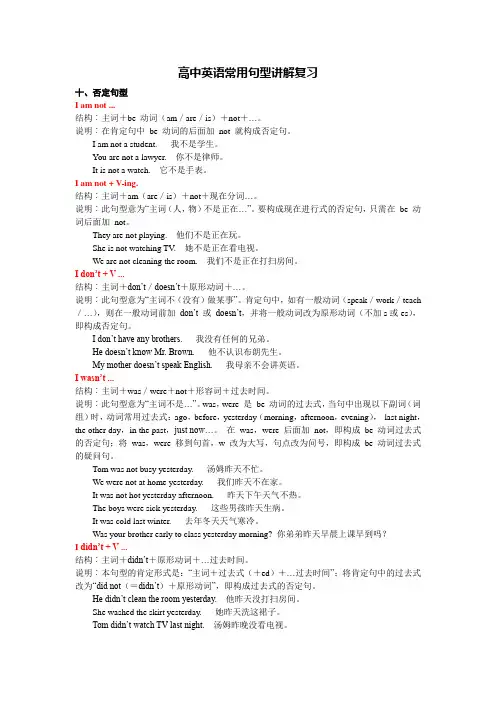
高中英语常用句型讲解复习十、否定句型I am not ...结构︰主词+be 动词(am/are/is)+not+…。
说明︰在肯定句中be 动词的后面加not 就构成否定句。
I am not a student. 我不是学生。
You are not a lawyer. 你不是律师。
It is not a watch. 它不是手表。
I am not + V-ing.结构︰主词+am(are/is)+not+现在分词…。
说明︰此句型意为“主词(人,物)不是正在…”。
要构成现在进行式的否定句,只需在be 动词后面加not。
They are not playing. 他们不是正在玩。
She is not watching TV. 她不是正在看电视。
We are not cleaning the room. 我们不是正在打扫房间。
I don’t + V ...结构︰主词+don’t/doesn’t+原形动词+…。
说明︰此句型意为“主词不(没有)做某事”。
肯定句中,如有一般动词(speak/work/teach /…),则在一般动词前加don’t 或doesn’t,并将一般动词改为原形动词(不加s或es),即构成否定句。
I don’t have any brothers. 我没有任何的兄弟。
He doesn’t know Mr. Brown. 他不认识布朗先生。
My mother doesn’t speak English. 我母亲不会讲英语。
I wasn’t ...结构︰主词+was/were+not+形容词+过去时间。
说明︰此句型意为“主词不是…”。
was,were 是be 动词的过去式,当句中出现以下副词(词组)时,动词常用过去式:ago,before,yesterday(morning,afternoon,evening),last night,the other day,in the past,just now…。

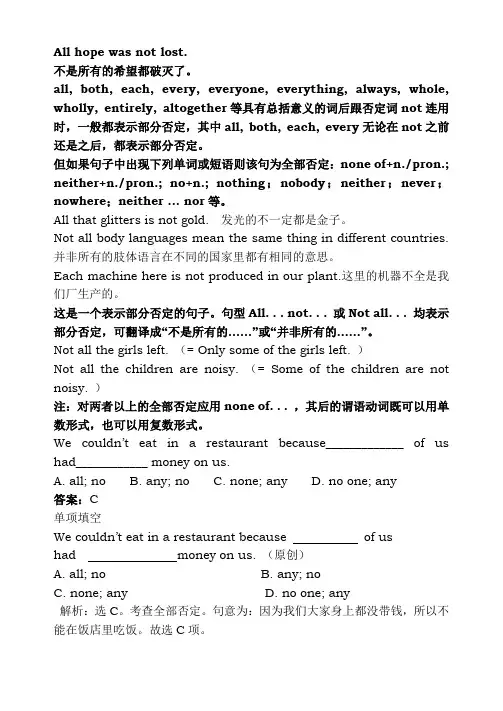
All hope was not lost.不是所有的希望都破灭了。
all, both, each, every, everyone, everything, always, whole, wholly, entirely, altogether等具有总括意义的词后跟否定词not连用时,一般都表示部分否定,其中all, both, each, every无论在not之前还是之后,都表示部分否定。
但如果句子中出现下列单词或短语则该句为全部否定:none of+n./pron.; neither+n./pron.; no+n.; nothing;nobody;neither;never;nowhere;neither ... nor等。
All that glitters is not gold. 发光的不一定都是金子。
Not all body languages mean the same thing in different countries. 并非所有的肢体语言在不同的国家里都有相同的意思。
Each machine here is not produced in our plant.这里的机器不全是我们厂生产的。
这是一个表示部分否定的句子。
句型All. . . not. . . 或Not all. . . 均表示部分否定,可翻译成“不是所有的……”或“并非所有的……”。
Not all the girls left. (= Only some of the girls left. )Not all the children are noisy. (= Some of the children are not noisy. )注:对两者以上的全部否定应用none of. . . ,其后的谓语动词既可以用单数形式,也可以用复数形式。
We couldn’t eat in a restaurant because_____________ of us had____________ money on us.A. all; noB. any; noC. none; anyD. no one; any答案:C单项填空We couldn’t eat in a restaurant because of ushad money on us. (原创)A. all; noB. any; noC. none; anyD. no one; any解析:选C。
LECTURE 4比较结构本堂目标紧接上一堂课中的比较状语从句熟悉各种比较结构,掌握各种比较结构译法,准确理解考研英语中含有比较结构的难句。
基础预习一、同级比较【例1】(05-Text 4)【例2】二、the more…the more…句型表示比较这个句型是个比例句,表示同时增加或减少。
从结构上看,这个句型前半部分是从句,后半部分是主句,即“the+比较级(从句),the+比较级(主句)”。
比较级部分都在各自主从句中充当一定的成分。
【例】(01-Passage 2)三、表示达到最高程度的结构四、表示“倍数”比较的三种句型【例1】(00-Passage 2)【例2】(05-Part B)【例3】(00-Passage 1)重点讲解一、 n o …more than 表示比较no more …than 这一句型是考研英语中出现比较频繁的句型,这一句型有一变体形式“not…any more than”。
功能上看,这一句型表示的是两个事物之间的类比关系,即用than 后面的事物来作比,阐明前边主句所要表达的观点;意思上讲,这个结构表示:同…一样不”,特别注意的是,than后面的句子为肯定形式,但要译成否定意义。
【例】(06-49)二、(just) as…, so…结构表示类比此句型的意思是“正好…,所以…”,so后面的句子多用倒装结构。
【例】三、not…so much as表示比较考研英语中,not…so much as…这一句型也增多次出现,该句型从结构上来看,可以有not A so much as B或者not so much A as B两种结构,其中A和B是两个被比较的平行结构,如:同为介词短语,动词不定式,名词短语或其他平行结构。
从意思上来看,该句型的基本含义为“与其说A倒不如说B”,或“是B,而不是A”。
【例1】(94-翻译)【例2】(01-Passage 5)【例3】(05-翻译)四、其他more than结构的理解与翻译1.more than表示“不仅是,非常,十分”等在很多句子中,more than不能按字面意思翻译成“比…多”,而是要引申转译为“不仅仅是”或“不只是”。
英语四级语法必读:否定用法详解英语四级语法必读:否定用法详解导语:大学英语四级考试涉及的语法知识点多、涉及面宽,对不少考生来说都是一个难题。
以下是小编为大家精心整理的英语四级语法必读:否定用法详解,欢迎大家阅读参考!否定:全部否定和部分否定eg. All the birds can not fly。
Not all the birds can fly. 不是所有的鸟都会飞。
1. 部分否定eg. All the birds can not fly. 并非所有的鸟都会飞。
None of the birds can fly. 所有的鸟都不会飞。
代词或副词如all,both,every,everybody,every day,everyone,everything,everywhere等与not搭配使用时,表示部分否定,意思为“并非都是"等。
eg. All is not gold that glitters. 发光的`并非都是金子。
= Not all is gold that glitters。
2. 全部否定英语中常用not,none,nobody,nothing,nowhere,neither,never等表示全部否定的概念。
eg. Nothing in the world is difficult for one who sets his mind to it. 世上无难事,只怕有心人。
eg. W: Daddy, I 've decided to give up science and go tobusiness school。
M: Well, it is your choice as long as pay your own way, but I should warn you that not everyone with a business degree will make a successful manager。
中考英语《句型分类》考点:比较句型分类与应用 为您整理“中考英语《句型分类》考点:比较句型分类与应用”,欢迎阅读参考,更多精彩内容请继续关注我们的网站(www.)。 中考英语《句型分类》考点:比较句型分类与应用 句型[主语(主体)+谓语+as+形容词/副词+as+被比对象] 1. He is as tall as I (am). 2. This window is just as wide as that one. 3. This is just as good an example as the other. 4. Does John work as hard as Henry? 5. We have accomplished as much in the past three years as would have taken ten years in the past. [注] 如果形容词后有一个单数可数名词, 不定冠词应置于名词之前形容词后, 如:He is as poor a speaker as I. 句型[主语+谓语+no more形容词//副词(或no +形容词/副词比较级)+than+被比对象] 1. She is no less diligent than her elder sister. 2. One minute too late is no more in time than half an hour. 3. The food on the ship was no better than on any other ship on which Billy had sailed. 4. We too have a head and two hands and are no stupider than others. 5. China's women, no less than men, are participating in all kinds of work in the socialist construction of their country. [注] 如果两个主语相比,谓语动词应与前一个保持一致关系。如: He no less than you is (不是are) diligent. [附注] 表示等比的还有以下一些方式: 1) "…be equal to+被比对象"如:A dingle day is equal to twenty years. In strength, he is equal to me. 2) "…be worth+被比对象" 如:An inch of time is worth an inch of gold. A bird in the hand is worth two in the bush 3) 用其他词语表达:Three early mornings will make a day. Only he in our class can cope with you in knowledge of English. 句型[主语+谓语+形容词比较级/ 副词比较级+(名词)+than+被比对象] 1. Too much help is sometimes worse than no help. 2. Facts speak louder than eloquence. (Actions speak louder than words.) 3. Our room is a little larger than theirs and it has more furniture in it. 4. Light does not travel at the same speed through all materials; it goes slower through some than through others. [注] 这种形容词组合还可以作定语,置于名词之后。如:It feeds on worms and other fish smaller than itself. 句型[主语+谓语+more/less+形容词原级/副词+than+被比对象] 1. This book is more interesting than that one. 2. He is more attentive in class now than he was last term. 3. It's less cold than it was yesterday. 4. He works more regularly than you do. 5. The new edition is less expensive than the old one. [注1] 使用比较级要注意两点: 1) 不要使用双重比较级, 如:(误) His younger brother was more stronger than he. (正) His younger brother was much stronger than he. His younger brother was stronger than he. 2) 不要使用无比较对象的孤立的比较级。如:(误) We saw many smaller houses on both sides of the river. (正) We saw many small houses on both sides of the river. (正) We saw many houses smaller than usual on both sides of the river. [注2] 比较级前可加一些增强语气的词,如:much, even, still, a little (bit), slightly, far , any, no, a lot 等。 My room is a little (bit) smaller than hers. Eighteen is much less than eighty. [注3] 如果表示"因…而更…" 可用句型 the+比较级+for (或because, as等词), 如: I like him all the better for his faults. I do not like him the less because he has faults. He is none the happier for his wealth. A good tale is none the worse for being twice told. 句型[主语+谓语+not so/not as+形容词原级/副词+as+被比对象] 1. Tom is not so tall as his brother. (Tom is less tall than his brother.) 2. Mr. Green is not so old as he looks. 3. It isn't as cold as it was yesterday. 4. John doesn't work so hard as Henry. 5. Dawney answered slowly: "Never so happy as when my hands are full. 句型[主语+谓语+以or结尾的形容词比较级+to+被比对象] 1. His strength is superior to (=greater than) mine. 2. My knowledge is inferior to (=less than) his. 3. Is your father senior to mine? My father is junior to yours. 4. His arrival in New York is posterior to that of my friend. 5. Colored people are by no means inferior to white people. 句型[被比对象(第一分句暗示某种程度)+主体(第二分句含比较级)] 1. I caught the last bus from town; but Harry came home even later. (He came home later than I.) 2. The Long March is great, but the New Long March will be greater, and more arduous. 3. Dear as are father and mother, the motherland is still dearer. 4. One of my suitcases is small, and the other one is medium. 句型[主语+谓语+absolute superiority over+被比对象] [主语+谓语+above/ next to+被比对象] [主语+can't compare with+被比对象] 1. The socialist system has demonstrated absolute superiority over the capitalist one. 2. The price of wisdom is above rubies. 3. We love truth above everything else. 4. As long as men live, water will continue to be what it is today - next in importance to oxygen. 5. Next to the Yangtze, the Yellow River is the second longest river in our country. 6. It is worth next to nothing. 7. How could Napoleon compare with Lenin? 8. The situation of the enemy cannot compare with ours. [附注] 关于等差句有以下几点需要注意: 1) 句型16 "not to speak of" 等词组也可用以表示差比, 如: Even a worm, when trodden on, will turn, not to speak of a man outraged. 2) former, latter, elder等形容词, 词尾虽然是比较级形式, 但它们永远不用于比较句中, 也不能跟than, 如: He will come here in the latter part of year. 3) 等差既可以指出相差的数目, (用by+数词表示) 也可以指出相差的范围, 如: of +名词, with regard to, in point of, with respect to, with reference to, with relation to, in the sphere of, in the field of等等。例句: She is the more patient of the two. In point of commerce, Shanghai is more prosperous than Nanjing. With reference to territory, China is larger than America. 4) 有些语句的词序变动较大阅读和翻译时要弄清其结构。如:
英语语法:带有否定词的比较句型
1.no better than:表示“和……一样;实际等于……”,如:
He is no better than a beggar. 他实际上等于一个乞丐。
The invalid is no better than he was yesterday. 病人的情况和昨天一样。
He has no better a say in the matter than I have. 他和我一样在这件事上没有发言权。
2.not. . . any more than或no more. . . than:表示“同……一样不”,如:
I could no more do that than you. I could not do that any more than you. 你不能做这件事,我也不能做。
He is not a poet any more than I am a scholar. 我不是一个学者,他也不是一个诗人。
This story is no more interesting than that one. 这个故事和那个故事一样没有趣味。
He is no more able to read German than I am. 他和我一样都不懂德语。
3.not so much. . . as:表示“与其……不如……”
He is not so much a writer as a reporter. 他与其说是个作家,不如说是个记者。
Your explanation does not so much enlighten us as confuse us.
你的解释没有起到启发作用,反而把我们弄糊涂了。
Oceans don't so much divide the world as unite it. 与其说
海洋分隔了世界,不如说海洋联结了世界。
I don't so much dislike him as hate him. 我与其说不喜欢他,不如说我恨他。
4.nothing like:表示“没有什么能比得上……”
There is nothing like home. 金窝银窝,不如自己的草窝。
There is nothing like walking as a means of keeping fit.
没有比散步来保持健康更好的了。
There is nothing like leather for shoes. 做鞋用皮革再好没
有了。
5.nothing like(或near)as(或so)... as:表示“远远不像……那样”
This novel is nothing near so interesting as that one. 这
篇小说远远不及那篇小说有趣。
The book is nothing like as difficult as I expected. 这本
书远没有我想像的那么难懂。
His analysis of the poem is nothing like as penetrating
as yours. 他对这首诗的分析远没有你的分析那样透彻。
6.no less … than:表示“和……一样”
He is no less active than he used to be. 他和从前一样活跃。
His mind is no less alert than yours. 他的思路和你的一样
敏捷。
Our soldiers fought with no less daring than skill. 我们
的士兵作战的英勇不亚于他们的战斗技能。